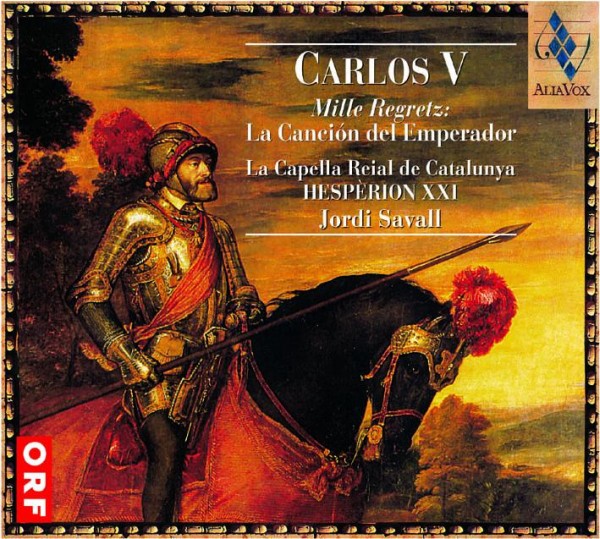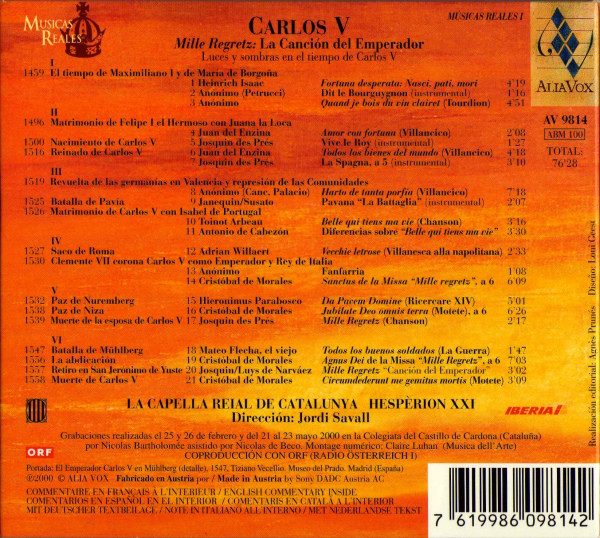
kompozytor
Cabezon, Antonio de;
Desprez, Josquin;
Willaert, Adriaen
tytuł
Carlos V: Mille Regretz
wykonawcy
La Capella Reial de Catalunya;
Savall, Jordi;
Hesperion XXI
Savall, Jordi;
Hesperion XXI
nr katalogowy
AV 9814
opis
This unique programme was inspired by what Jordi Savall describes as "The moving abdication speech that Charles V made on 25 October 1556, in the great hall of Brussels Castle". Savall's purpose is to explore "the essential experiences in the life of Charles V and draw closer to a period of such profound significance for our own modern history". (Charles was the King of Spain, the last Western Emperor and, according to Savall, "the first and last great Emperor of Europe".) The programme draws upon choral works, songs and instrumental pieces; courtly, spiritual and popular music from Burgundy, Germany, Italy and Spain, the best-known composer being perhaps Cristóbal de Morales. However, it is not his Sanctus de la Missa "Mille Regretz" which is the title piece, but a work of the same name by Josquin des Prés, a sombre part-song also known as the Emperor's Song. Combining the forces of two of his ensembles, Hespèrion XXI and La Capella Reial de Catalunya, Savall offers a luxurious sequence of great musical richness, albeit one seeped in the essential melancholy which held the Emperor's heart. Those beguiled by Diáspora Sefardí and Anthony Holborne: The Teares of the Muses 1599 can be assured that this is as imaginative and beautiful as anything Savall has ever done. --Gary S. Dalkin
• anon.: Fanfarria
• anon.: Harto de tanta porfía
• anon.: Quand je bois du vin clairet
• Arbeau: Belle que tiens ma vie
• Cabezón, A: Diferencias sobre Belle qui tiens ma vie
• Josquin: La Spagna
• Josquin: Mille Regretz
• Josquin: Vive le roy
• Encina: Amor con fortuna
• Encina: Todos los bienes
• Flecha I: Ensalada 'La guerra'
• Isaac: Fortuna desperata: Nasci, pati, mori
• Janequin: Pavana 'La Battaglia'
• Morales, C: Circumdederunt me gemitus mortis
• Morales, C: Jubilate Deo omnis terra
• Morales, C: Missa 'Mille regretz': Sanctus, Agnus Dei
• Parabosco: Da Pacem Domine
• Willaert: Vecchie letrose
Works: • anon.: Dit le Bourguygnon
• anon.: Fanfarria
• anon.: Harto de tanta porfía
• anon.: Quand je bois du vin clairet
• Arbeau: Belle que tiens ma vie
• Cabezón, A: Diferencias sobre Belle qui tiens ma vie
• Josquin: La Spagna
• Josquin: Mille Regretz
• Josquin: Vive le roy
• Encina: Amor con fortuna
• Encina: Todos los bienes
• Flecha I: Ensalada 'La guerra'
• Isaac: Fortuna desperata: Nasci, pati, mori
• Janequin: Pavana 'La Battaglia'
• Morales, C: Circumdederunt me gemitus mortis
• Morales, C: Jubilate Deo omnis terra
• Morales, C: Missa 'Mille regretz': Sanctus, Agnus Dei
• Parabosco: Da Pacem Domine
• Willaert: Vecchie letrose
nośnik
CD
gatunek
Muzyka klasyczna
producent
Alia Vox
data wydania
28-11-2010
EAN / kod kreskowy
7619986098142

(Produkt nie został jeszcze oceniony)
cena 68,00 zł
lubProdukt dostepny w niewielkiej ilości.
Wysyłka w ciągu 3 dni roboczych
Darmowa wysyłka dla zamówień powyżej 300 zł!
Darmowy kurier dla zamówień powyżej 500 zł!
sprawdź koszty wysyłki










































